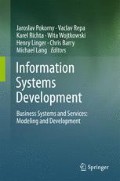Abstract
It has been assumed that information technologies and public information systems like e-government and e-health would bring substantial positive effects. The current results of public information systems are not too optimistic as there are barriers due to an improper setting of legislative and related processes, especially of (personal) data secirity rules and processes. The processes in fact almost completely exclude the computation of open information from sensitive data . We show that it has substantial negative effects but it still does not assure required personal data security . The undesirable effects are not only important, but sometimes they are fatal. This problem is frequently underestimated and often overlooked. The current practices substantially limit the applicability of the concepts of artificial intelligence, knowledge society, and semantic web. We propose solutions enabling to change current undesirable practices like massive data deletion. The solutions are based on the combination of processes performed by a trusted body. We discuss technical solutions enabling implementation of our proposals and specifying ways of changing current legislative to enable them. It must be based on the change of social and legislative conditions like prejudices of public (Big Brother hysteria).
Access this chapter
Tax calculation will be finalised at checkout
Purchases are for personal use only
References
Ang J, Cherbakov L, Ibrahim M (2005) SOA antipatterns. http://www-128.ibm.com/developerworks/webservices/library/ws-antipatterns/
Committee on Engineering Education, National Academy of Engineering (2007) Education of engineer of 2020. The National Academies Press, Washington
Goldratt EM (1997) Critical chain. North River Press, Great Barrington
Jamieson L (2007) Engineering education in a changing world. The Bridge Spring 2007. http://www.designcon.com/infovaumeah_jamieson_keynote.pdf
Kral J, Zemlicka M (2001) Electronic government and software confederations. In: Tjoa AM, Wagner RR (eds) Twelfth international workshop on database and experts system application. IEEE Computer Society, Los Alamitos, CA, USA, pp 383–387. doi:10.1109/DEXA.2001.953091
Kral J, Zemlicka M (2008) Bottleneck of knowledge society. In: Lytras MD, Carroll JM, Damiani E, Tennyson RD, Avison D, Vossen G, De Pablos PO (eds) The open knowlege society: a computer science and information systems manifesto. Communications in computer and information science, vol 19, pp 83–91. Springer, Berlin, Heidelberg. doi:10.1007/978-3-540-87783-7_11
Manpower (2008) Talent shortage survey: 2007 global results. http://www.manpower.com/research/research.cfm
Mervis J (2007) Congress passes massive measure to support reearch and education. Science 317:736–737. doi:10.1126/science.317.5839.736
Mervis J (2007) U.S. says no to next global test of advanced math, science students. Science 317:1851. doi:10.1126/science.317.5846.1851
Mervis J (2008) A new bottom line for school science. Science 319:1030–1033. doi:10.1126/science.319.5866.1030
Pipino L, Lee YW, Wang RY (2002) Data quality assessment. Commun ACM 45(4):211–218. doi:10.1145/505248.5060010
Spellings M (2006) Answering the challenge of a changing world. U.S. Department of Education. http://www.ed.gov/about/inits/ed/competitiveness/strengthening/strengthening.pdf
W3 Consortium (2000) Simple object access protocol. http://www.w3.org/TR/SOAP
W3 Consortium (2002) Web services activity. http://www.w3.org/2002/ws/
Acknowledgments
This work has been partially supported by the Czech Science Foundation by the grant number 201/09/0983.
Author information
Authors and Affiliations
Corresponding author
Editor information
Editors and Affiliations
Rights and permissions
Copyright information
© 2011 Springer Science+Business Media, LLC
About this paper
Cite this paper
Král, J., Žemlička, M. (2011). Bottleneck of the Development of Public Information Systems. In: Pokorny, J., et al. Information Systems Development. Springer, New York, NY. https://doi.org/10.1007/978-1-4419-9790-6_30
Download citation
DOI: https://doi.org/10.1007/978-1-4419-9790-6_30
Published:
Publisher Name: Springer, New York, NY
Print ISBN: 978-1-4419-9645-9
Online ISBN: 978-1-4419-9790-6
eBook Packages: Computer ScienceComputer Science (R0)

